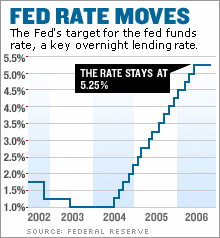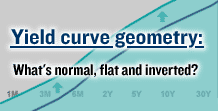Bernanke talks tough about inflationFed chief indicates growth is moderating, inflation is a more 'predominant' risk.NEW YORK (CNNMoney.com) -- Federal Reserve Chairman Ben Bernanke painted a relatively healthy picture of the economy in a speech Tuesday, indicating that weakness in the housing market may not put a significant dent in growth. But the head of the nation's central bank also maintained that inflation remains a threat, a possible sign that the Fed is more likely to raise interest rates next year instead of lowering them.
Speaking at a lunch in New York City hosted by the National Italian American Foundation, Bernanke indicated that the economy would likely grow at a moderate pace in the fourth quarter and early 2007 but that growth would pick up over the course of next year. Bernanke added that the worst may be over for the slumping housing market. "Although residential construction continues to sag, some indications suggest that the rate of home purchase may be stabilizing, perhaps in response to modest declines in mortgage rates over the past few months and lower prices in some markets," he said. He also said the Fed is keeping a close eye on inflation, particularly since the job market is improving. With unemployment relatively low and wages on the rise, Bernanke said the central bank is concerned about what may happen if corporations do not absorb the increased labor costs and start charging higher prices for goods as a result. "The more worrisome possibility is that tight product markets might allow firms to pass all or part of their higher labor costs through to prices, adding to inflation pressures," he said. With that in mind, Fed watchers said that it's likely the central bank is not going to consider cutting interest rates anytime soon. Lower interest rates tend to spur economic growth and corporate profits, thus lifting stock prices. Many investors had been hoping for a rate cut sometime soon after 17 straight hikes from June 2004 through June 2006. The Fed has held its key short-term rate steady at 5.25 percent at its past three meetings, and it's looking increasingly likely that the central bank's policy-makers will leave rates unchanged when they meet Dec. 12 - and perhaps for several meetings beyond that. "I think the fed funds rate will stay at 5.25 percent for the next several months at least," said Ken Kim, an economist with Stone & McCarthy Research Associates, an economic and fixed income research firm based in Princeton, N.J. Kim said it was particularly telling that Bernanke used the word "predominant" to describe inflation risks. He thinks that's a clear sign that the Fed is still very worried about inflation and is not planning on lowering rates anytime soon. In fact, one Fed watcher said it's possible interest rates could head higher sometime next year if inflation remains a threat. "The Fed is right to sit where they are for awhile but don't ignore what the Fed is saying. Don't rule out a rate hike. You have to keep that in mind," said Steve Van Order, chief fixed income strategist with Calvert Funds in Bethesda, Md. But another economist disputed Bernanke's notion that the job market is improving and said the Fed should soon consider lowering rates. David Kelly, economic adviser at Putnam Investments in Boston, said that if economic growth in the fourth quarter winds up near where it was in the second and third quarters -between 1.6 percent and 2.6 percent - that would mark the third consecutive quarter that the economy grew at an annual rate below 3 percent. So if anything, Kelly argues that unemployment rates could soon head higher. Kelly added that he thinks Bernanke, like his predecessor Alan Greenspan, is talking tough on inflation as a way to try and get long-term interest rates to move higher. "I can't decide whether Bernanke's seeing the world differently from the rest of us or if he's just trying to push up interest rates. But it seems to me that the bond market isn't buying what the Fed is selling," he said. Long-term rates have remained stubbornly low despite the Fed's series of rate hikes. The yield on the 10-year Treasury note currently stands at 4.5 percent, well below the fed funds rate. When long-term rates are lower than short-term rates, a phenomenon known as an inverted yield curve, that's often been a predictor of a recession, though many economists say that now it's more likely a signal of slower growth ahead. "We're grappling with the conundrum again," said John Hendricks, senior vice president with Hartford Investment Management, referring to a term that Greenspan used to describe the low long-term rates. "I don't expect that will change between now and year end." Jim Glassman, senior economist with J.P. Morgan Chase, also thinks the Fed's tough talk is simply a reminder to the market that it has to remain vigilant about inflation - since that's the Fed's job. "This is the view that the Fed is supposed to have. They are the only people in charge of keeping inflation down," Glassman said. "This is the Fed's way of saying just because the economy is slowing and oil prices have come down, we can't let our guard down on inflation yet." |
| ||||||||||||||||||




